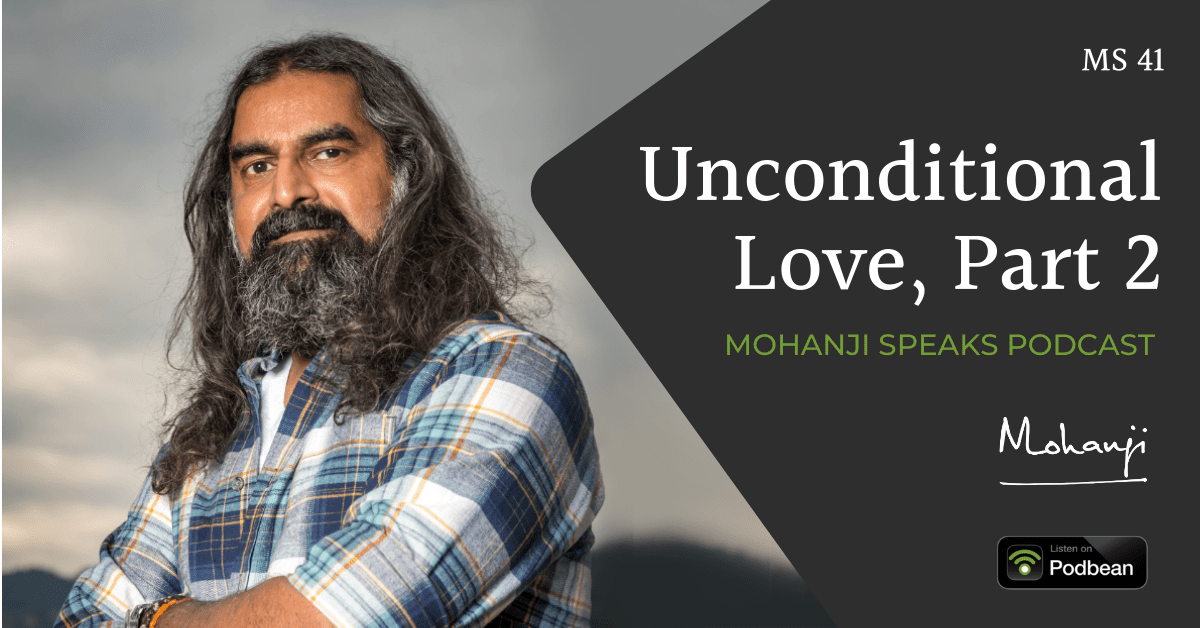Mohanji: Welcome to Mohanji Speaks. These are answers to questions from listeners. Thank you for sending them. Keep sending them. I will try to answer them as best as I can.
Speaker: This is part two of the podcast series of a question from a listener on unconditional love.
Mohanji: Unconditional love is something which you’ve got to feel, where you are able to love everybody, everything, like a mother to the child, mother of any species to its children. How deep is the bonding, how much love, with no expectations? And if you look at the animal kingdom. Their love is far more unconditional than the human kingdom. A mother nurtures a child, just to empower the child to lead an independent life. After a while, the child goes away.
You look at the birds, the mother brings food, nurtures the birds. As soon as its wings become powerful to take the flight, the bird goes away when it doesn’t know the mother or father, it becomes independent. So, the animal kingdom, the birds, the animals, all those beings in nature, they just nurture and empower the children and leave them, then probably there’s no connection even.
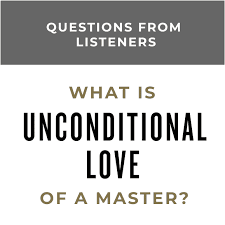
But in the human kingdom, we put a lot of expectations, which makes a relationship ugly – ownerships, controls, expectations, suffocation, disappointment. Then anger, hatred, jealousy, all sorts of things. This makes human life miserable. We don’t have to be miserable. We can be free.
Speaker: Here, Mohanji makes a really good point about freedom.
Mohanji: If our expectations are less in the world we are free. Fewer expectations, less disappointment; that is freedom. If you really want to know the freedom, you got to experience freedom from the mind and the senses, not the freedom of the mind and senses. It’s freedom FROM the mind and senses. It means, you’re happy with everything, but you’re not craving for anything. Freedom. So, this is what I would like to talk about; unconditional love. We can discuss much more about unconditional love in various aspects. But I think this is something which you got to experience not theoretically, practically.

Speaker: But to add on to that, and going a bit further, people are interested in how does a master’s love operate?
Mohanji: A Master, Master means what? Mastery. Mastery over what? Mastery over life. Life is a conglomeration of various things, inclinations and desires primarily. And this gives the flavour of existence, everybody’s existence. A tiger’s life, a lion’s life, a human life, take every life; it has its specific flavour of existence; specific method, specific way, inclinations tendencies, desires. They all have distinctions, so each species has it, and in human beings, we see everything, all sorts of desires, all sorts of inclinations. So, a master is somebody who has mastered this pull and push of desires, inclinations and tendencies. He has taken steps, well beyond the mind, well beyond senses, well beyond likes and dislikes, karmic bindings.
So, such a person is pretty tranquil, equanimous. He looks at everything with equanimity. He loves unconditionally. He lives for the world. He has not much personal interest. Of course, he would like to eat food and sleep and do whatever. But that’s not the driving force. The major driving force of his existence is to serve the world unconditionally, without expecting. Mastery is mastery over your mind, intellect and the ego. You’re going beyond these things, their craving is quenched; craving of mind – emotions, craving of intellect – information, craving of ego – ownerships. These three things are in control. Ownership or no ownership – it’s fine, me and mine – no value, likes and dislikes – quiet. Such a person is a master, then what kind of love can he give forth – only as himself. He looks at everybody as himself. He sees only the world as himself.
We all see the world as ourselves, but we put our flavour to the world, we see the world as we are. Master sees the world as it is. That’s the difference.
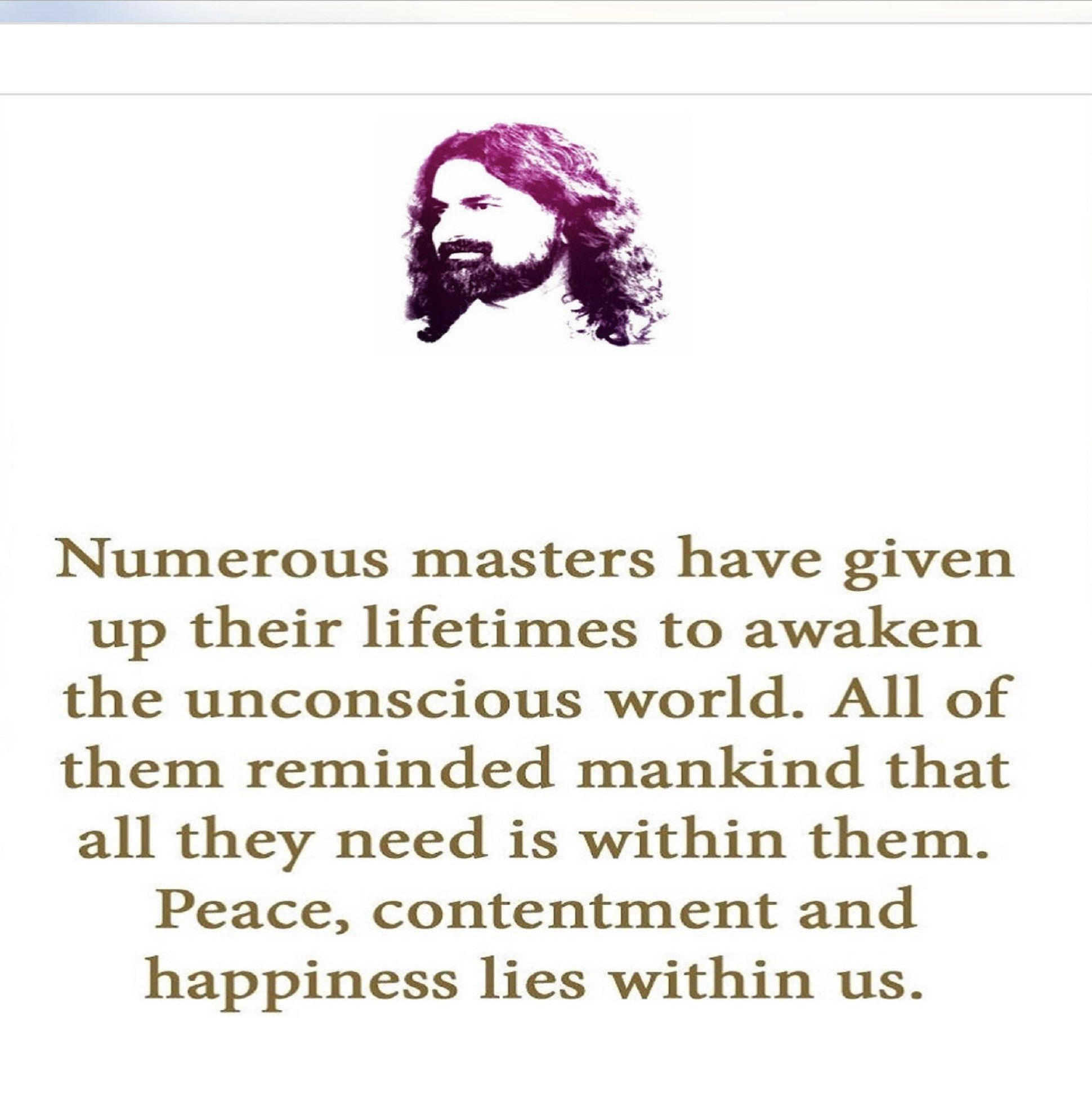
When you put your flavour, your own likes and dislikes, karmic combination, constitution onto the world; it’s like wearing a glass, which has colour. Wearing a glass which is yellow, would make everything look yellow. If it’s red, everything is red because you’re wearing such a glass. That’s how our life is. A karmic being lives like that. When you have gone beyond the control of your senses and mind, when I say mind it also includes intellect and ego, then there’s no colour. When you cross over there’s no colour. You’re looking at the world as it is. So, you’re only seeing the truth and you will not judge, you will not criticize, you will not manipulate, analyze, you just accept as it is, everything is as it is. Everything is as it is always.
So, you’re pretty free. You are very free. When you experience freedom and that is exactly what you see in the world. You won’t sit down and judge people, you won’t criticize, character assassinate, gossip, you will do nothing, you just accept everything as it is. When you start accepting life as it is, the world as it is, inside as it is, yourself as it is, there are no conflicts. There is total freedom.
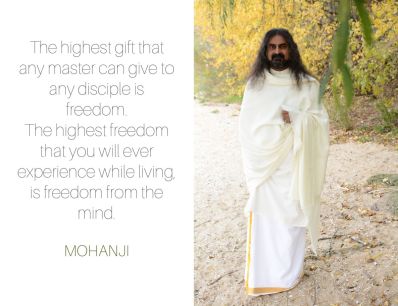
So, a Master looks at the world with total freedom, because he is walking freedom. That’s why many times, a conditioned society cannot understand a Master, why he behaves in a certain way, why he has certain opinions because society has kept itself or society functions itself conditionally in two dimensions. There’s a bigger third dimension, which is very difficult to see, the karmic dimension of every individual, which is from the time of birth, till the time of death that runs the show. Time-space situations are provided for experiences to happen. Who controls this? The karmic flow, sitting on linear time manifests it, we experience it, we keep the memory, and we kind of get involved in it, the role plays of life, the involvement in activities of life, which makes us feel that we are the doer. That’s an illusion. Actually, things are happening. And we are participating. Instead, we feel we are doing it, the ownership of action. It is a grand illusion. And if you dive into the depth of it, you will be surprised how much of an illusion we are holding every moment, how much we are struggling to maintain our name, fame and position in the world. We will be surprised to see; we need to contemplate. We need to understand. When we go deeper and deeper and deeper, and we realize, “Oh, this is the world where I’ve been foolishly chasing something external by ignoring what actually I am, what is internal.” That’s the time when you realize, “Oh My God, I wasted a lot of time on paltry pleasures, patterns, and they were running the life, they were running the show.” Patterns were running the show repeatedly, and we were pretty much endorsing it. We will realize all that. We pretty much endorse our patterns. If some pattern is disturbed, we become very disturbed. But that’s the very thing, which chains us, we start loving. That’s the irony of existence. The basic thing that chains us are our patterns, our inclinations tendencies, that’s what we entertain. We fight to keep it. We don’t allow it to be broken. And that’s exactly what should go to connect yourself, you are not your patterns. You’re not your patterns, you’re not your inclinations and tendencies. You’re not your desires, they all come and go. They don’t stay. So, once you understand that, just imagine your freedom. When a master has understood this, that is what is mastery. He has understood life, he has understood the patterns, he has understood the likes and dislikes, inclinations, all those things. When he has become freedom – when you become something, how do you look at the world? As you are, right. So, he has recognized what is real freedom. He sees the world as freedom. Acceptance happens. So, he accepts everybody as they are, not as he wants them to be. That is their job. If a person wants to evolve beyond their mind, a Master is available, as a benchmark. But Master never says “Become me.” What will a Master say? I’m available, like a mirror, you can look at me and find yourself.
Speaker: This concludes part two of the three-part podcast series on unconditional love, which is based on a question from a listener. Do keep your suggestions for topics coming in, send them to podcast@satsangs.mohanji.org. And we hope you enjoyed this. And the next and final episode of the three-part series will be coming out very soon. Have a good day.
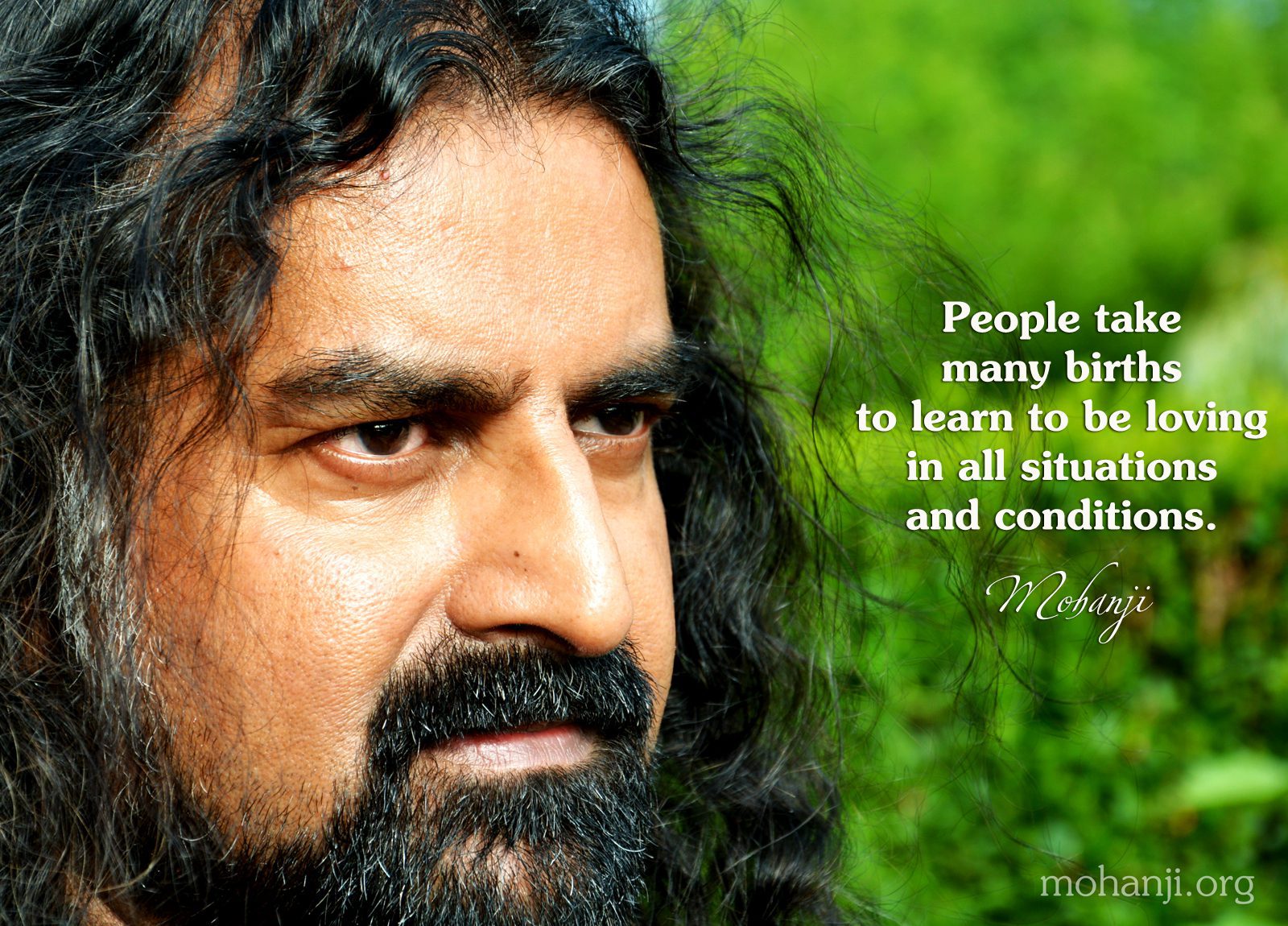
Transcribed by Ulla Bernholdt
Proofread by Rekha Murali
Subscribe to Mohanji Speaks daily podcast

